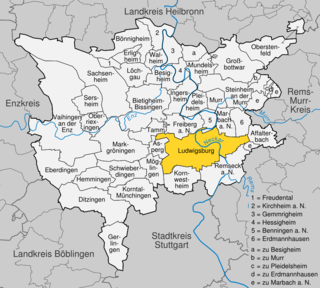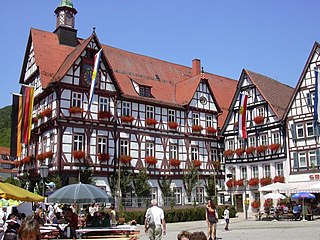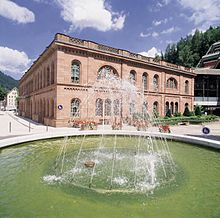
Baden-Baden is a spa town in the state of Baden-Württemberg, south-western Germany, at the north-western border of the Black Forest mountain range on the small river Oos, ten kilometres east of the Rhine, the border with France, and forty kilometres north-east of Strasbourg, France.

Justinus Andreas Christian Kerner was a German poet, practicing physician, and medical writer. He gave the first detailed description of botulism.

Ludwigsburg is a city in Baden-Württemberg, Germany, about 12 kilometres (7.5 mi) north of Stuttgart city centre, near the river Neckar. It is the largest and primary city of the Ludwigsburg district with about 88,000 inhabitants. It is situated within the Stuttgart Region, and the district is part of the administrative region (Regierungsbezirk) of Stuttgart.

Ludwigsburg Palace, nicknamed the "Versailles of Swabia", is a 452-room palace complex of 18 buildings located in Ludwigsburg, Baden-Württemberg, Germany. Its total area, including the gardens, is 32 ha – the largest palatial estate in the country. The palace has four wings: the northern wing, the Alter Hauptbau, is the oldest and was used as a ducal residence; the east and west wings were used for court purposes and housing guests and courtiers; the southern wing, the Neuer Hauptbau, was built to house more court functions and was later used as a residence.

Nikolaus Friedrich von Thouret was a German architect and designer.

Bad Wildbad is a town in Germany, in the state of Baden-Württemberg. It is located in the government district (Regierungsbezirk) of Karlsruhe and in the district (Landkreis) of Calw. Its coordinates are 48° 45' N, 8° 33' E. About 10,130 people live there. The current mayor is Mauro Gauger.

Bad Rappenau is a city municipality in the district of Heilbronn in Baden-Württemberg in southern Germany. It is situated about 15 kilometres (9 mi) northwest of Heilbronn.

Bad Urach is a town in the district of Reutlingen, Baden-Württemberg, Germany. It is situated 14 km east of Reutlingen, at the foot of the Swabian Jura, and is known for its spa and therapeutic bath.

Schloss Favorite is a Baroque maison de plaisance and hunting lodge in Ludwigsburg, Germany, which was used as a summer residence and hunting lodge. It is located on a rise, directly north of Ludwigsburg Palace to which it is connected via an avenue.

The Enz Valley Railway is a 23.6 km (14.7 mi) long railway line in the northern part of the Black Forest in the German state of Baden-Württemberg. The line runs from Pforzheim to Bad Wildbad and for its course runs close to the River Enz.

Heilbronn Hauptbahnhof is the main passenger railway station in Heilbronn in the German state of Baden-Württemberg.

Spa architecture is the name given to buildings that provide facilities for relaxation, recuperation and health treatment in spas. The architecture of these buildings is called "spa architecture" even though it is not a uniform architectural style, but a collective term for a genre of buildings with a spa function.

Karl Philipp Fohr, a brother of Daniel Fohr, was a German painter, born at Heidelberg in 1795.

The State Academy of Fine Arts Stuttgart is a university in Stuttgart, Germany. It was founded in 1761 and has been located on the Weissenhof since 1946. Its campus consists of three buildings: the Altbau, Neubau 1 or "Architects' Building", and Neubau 2.

Bruchsal Palace, also called the Damiansburg, is a Baroque palace complex located in Bruchsal, Germany. The complex is made up of over 50 buildings. These include a three-winged residential building with an attached chapel, four pavilions separated by a road, some smaller utility buildings, and a garden. It is noted for its fine Roccoco decoration and in particular its entrance staircase, which is regarded as one of the finest examples of its kind in any Baroque palace.

Friedrich Wilhelm Graf von Bismarck was a German lieutenant general, diplomat and military writer. He wrote several major military-political works and military histories, which were very pro-Napoleon.
Max Hirmer (1893-1981) was a German botanist, publisher and photographer.

The Friedrichsbad is a spa in the city of Baden-Baden in Germany. The Neo-renaissance spa building was completed in 1877.
Friedrich August Ludwig, Graf von Bismarck was a German lawyer and Member of Parliament.

























